An Interview with Pro MMA Fighter Lawrence Dunning, RKC
by Adrienne Harvey, SrPCC, RKC-II, CK-FMS, Primal Move Nat'l Instructor
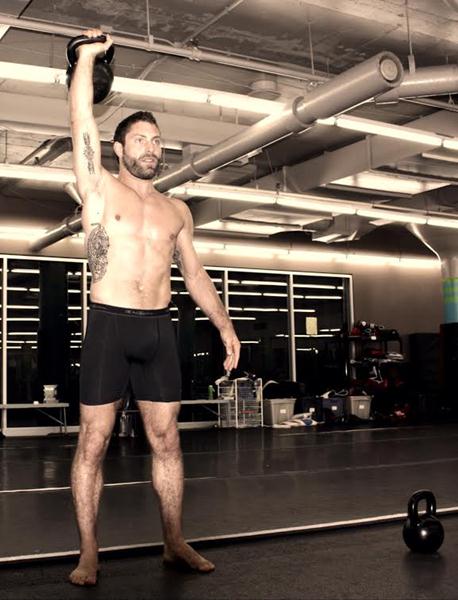
Dragon Door: You're an MMA fighter
and a triathlete, how did you get started with these two athletic endeavors?
Lawrence Dunning: I have participated in sports my whole life, and I'm 35 so that's a long time! As a kid, I was involved with endurance sports. In college I started to get into combat sports and began competing as an amateur boxer. It evolved to the point that training for triathlons became a way of maintaining my fitness for MMA.
Dragon Door: How did you start training with kettlebells?
Lawrence Dunning: I was doing some CrossFit style conditioning quite a while ago that incorporated kettlebell movements. Then, I started to hear about
RKC certified trainers after I’d taken a step back from working with my usual conditioning coaches. The conditioning coaches tended to overload me and didn't seem to understand that the very next day I'd be training twice or even three times. They were crushing me like a client they'd see only twice a week! So I started to work on my own with a couple of kettlebells at my apartment, and with one of the RKC trainers at my gym in Chicago.
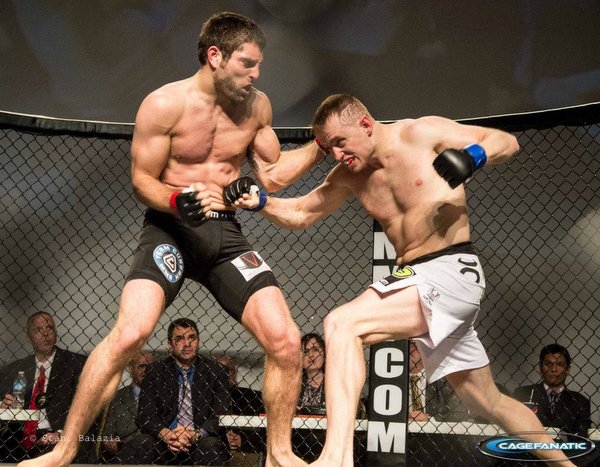
The RKC trainer had a program for fighters, and after a couple sessions I realized this type of training was the perfect blend of pushing myself while working on weaknesses. Also, her approach didn’t take so much out of me that my training the next day was detrimentally effected. I found that it was absolutely perfect. So, she became my conditioning coach and I had sessions with her 2-3 times a week.
Dragon Door: Other than the intensity and volume of these sessions being more appropriate for your situation, what else was different about your training with an RKC instructor?
Lawrence Dunning: The biggest thing for me was the tension and relaxation involved with
kettlebell movements. It is actually very similar to almost every movement—whether you're striking, wrestling, or practicing jiu jitsu—when you want to be quick, and fluid before adding tension only at the end. It’s like a punch, you want to be loose and relaxed, but right at the end you have tension, just like many of the kettlebell movements. I found that I was benefitting in small ways without even realizing it when practicing moves like the kettlebell snatch which requires you to tightening up the core and use your hips. It really is just like finishing the end of a punch.
When I first started reading about kettlebells about 10 years ago, it seemed like the training was designed for the Soviet military and special forces as a very combat-oriented style of conditioning. And I definitely think it is. For example, the basic foundation movement—the swing—is a perfect full body movement. You don’t want to train athletes with isolation exercises because almost all athletic movements use so many different muscles at the same time. I love that the swing gets your body working as a unit while developing metabolic conditioning, along with explosive hips. In fighting, hips are so important for everything from throwing a proper punch to shooting in for a takedown. They are also important in jiu jitsu, which is all about the hips—using yours or controlling your opponent’s.
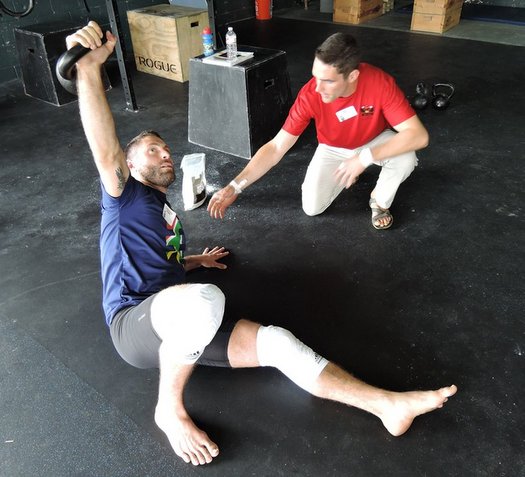
I love the Turkish get-up because it balances the right and left sides of the body, which is very important for injury prevention. Since I’m an older fighter, I am all about preventing injuries before they ever happen. By practicing get-ups, you get strong shoulder stability, it opens up your chest and shoulders, and you develop a good dynamic core. The get-up is also similar to a jiu jitsu stand-up. In a fight, if the opponent is standing over you, you want to get to your feet as soon as possible.
At the RKC certification, you have to do
100 snatches in 5 minutes as one of the tests. If I had to pick one activity that mimics a fight in terms of muscular strength and endurance—as opposed to running 800-meter relays (which are very brutal), and something else I do—I would say doing 100 snatches in 5 minutes is probably the closest to an actual fight. It is absolutely brutal, focused, and something I can do any time I’ve missed a session but still want to work out. After warming up and practicing a few skills, I can bang out 100 snatches in 5 minutes and have an amazing workout. The kettlebell snatch is my favorite thing.
Dragon Door: What inspired you to attend the RKC workshop?
Lawrence Dunning: I was training with
Katie Petersen, an RKC Level-II coach at my gym, and I knew that the RKC was something I wanted to do right from the beginning. I wanted to perfect my form and meet the technical, strength, and endurance goals necessary to pass the tests at the workshop. I also thought that it would be a good thing to train for the course, since RKC style kettlebell training has been the conditioning I’ve used to prepare for the last two fights I had this year—and it worked out great!
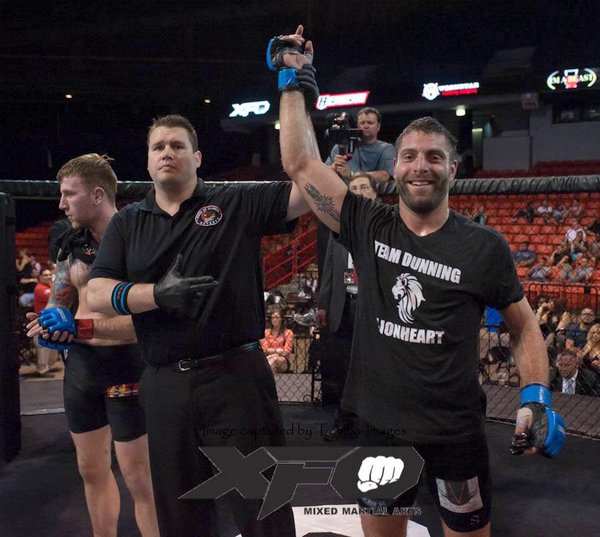
Dragon Door: According to your fight history online, those last two fights went very well for you!
Lawrence Dunning: They did go well. After the last one, a friend of mine who is a trainer said, "Whatever you are doing now for your conditioning, keep doing it!" I found that I feel my physical best when using a combination of kettlebells and running. Since I have a running background and used to compete in track, I also do 800 meter repeats which I think can also be very brutal too. A combination of some sprint repeats and kettlebell work is just perfect for fighting in terms of conditioning.
Dragon Door: Are you still competing in triathlons?
Lawrence Dunning: I did one this year, and whenever I have a big break between fights I like to do things like triathlons to keep a good aerobic base. Some fighters make the mistake of getting out of shape between fights, then they go straight to intense training. But without a good aerobic base, they won’t get the full benefit of that training. I've always found it's been best to maintain a base, then I will be ready when a fight is in six weeks and need to train hard.
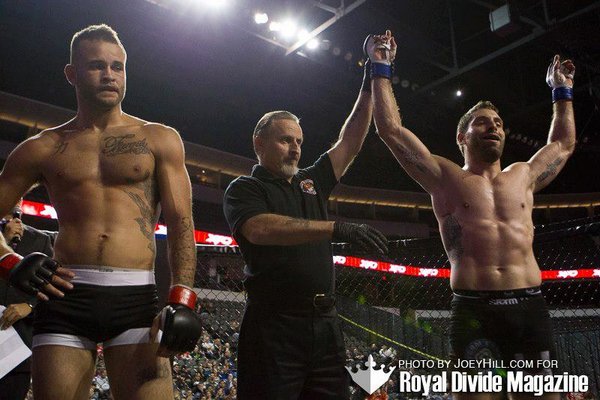
Dragon Door: When is your next fight?
Lawrence Dunning: I was actually supposed to fight this weekend, but my opponent pulled out a few days before the fight. Now the next one will be towards the end of the year. It has been frustrating because of all the sacrifice, dieting and all the things involved with preparing for a fight. But, there's also a jiu jitsu tournament in Chicago, so all that training can pay off for something!
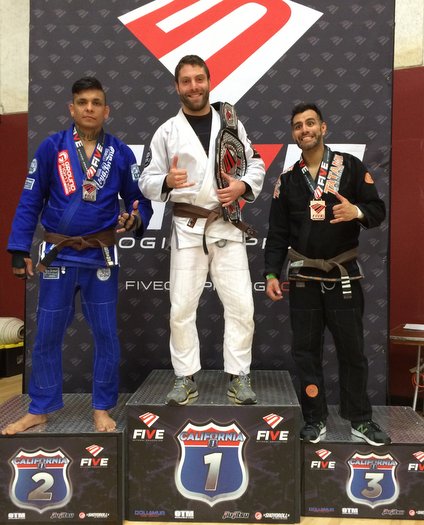
There’s a lot of grappling in MMA, and while the tournaments are amateur, they are often at a very high technical level since many of those guys only train jiu jitsu. In MMA, we have to train all the different styles, so it dilutes some of our efforts. But Brazilian jiu jitsu tournaments are a great way to stay sharp and see how the game is evolving. It might be a recent phenomenon, but a lot of the Brazilian jiu jitsu guys are also doing a lot of kettlebell work too. The benefits that are specific to MMA are also very applicable to jiu jitsu because of all the focus on the hips.
I love jiu jitsu, and actually help teach with my instructor at his school. When I was younger, I was more of a boxer, but I wanted less head trauma as I got older and naturally evolved to a more grappling style of MMA.
Dragon Door: What was most valuable for you at the RKC workshop?
Lawrence Dunning: Before the RKC, the trainer who I was working with—Katie Petersen—did a great job preparing me and a couple of the other guys who also attended the workshop. I am a big believer in muscle memory and repetition. Working with Katie 2-3 times a week for hour sessions obviously gave me some repetition, but there’s nothing like an
RKC workshop weekend with a total of about 22 hours of practice.
I feel like I was able to build a lot of muscle memory and sharpen just about everything. I think that's so important, and specifically useful for me since kettlebell training fits with everything else I’m doing. It was great to have a weekend to focus on just that one aspect of my training and sharpen everything up technically. Every single movement improved for me after the weekend.
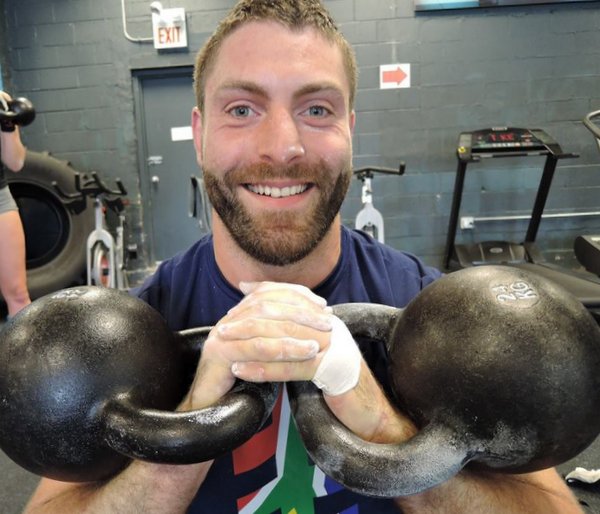
I personally liked being around similar-minded people, and it was a great group at the workshop. It was also such a brutal weekend, it takes it out of you!
Dragon Door: What's your next big goal?
Lawrence Dunning: It takes a very long time to get a black belt in jiu jitsu, but I am getting closer and want to win a major jiu jitsu tournament as a brown belt first, like the Pan-American championships, or something comparable. I am also flirting with the idea of doing the
RKC-II, I just want to make sure that I can commit to really training hard for that. And I would like to have a good win streak going with a couple more good wins before I close the door on my MMA career. I have a lot of work to do!
Dragon Door: What is most unique about you as an instructor and an athlete?
Lawrence Dunning: My fighting nickname is Lionheart because I have a big heart and am always trying to improve. I think MMA is the ultimate, though most people only see it on a superficial level—and I don’t even like watching the fights which are extremely bloody and gory. But ultimately, MMA is human chess and has roots into the oldest sports in Ancient Greece. I think it’s the perfect athletic challenge to try to master all the skills involved in MMA. It can take an adult lifetime to master just one aspect, and in MMA we try to master three or four while developing our own individual fighting styles.
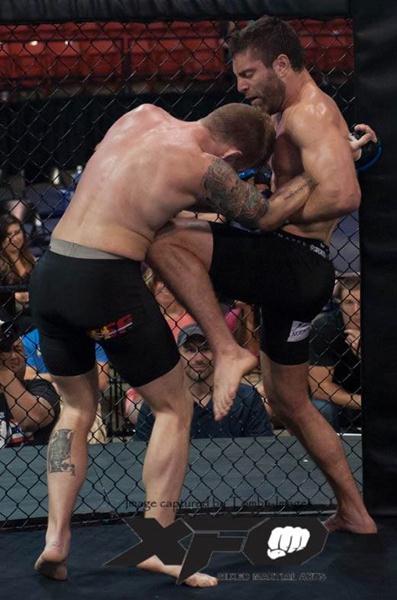
It's also a challenge to balance every aspect. If you're really technical but lack the correct strength and conditioning, then you're going to get overpowered. If you are a great athlete with great conditioning, but are slacking on the technical side, you can be technically beaten too. You have to cover all the bases and be incredibly structured and disciplined to put in all the time, effort, and work. I think my success is due to diligence and hard work instead of getting by on natural talent—even more so because I am an older competitor.
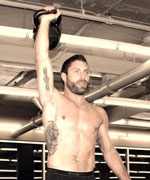 Lawrence Dunning, RKC can be contacted by email: sirdunning@gmail.com.
Lawrence Dunning, RKC can be contacted by email: sirdunning@gmail.com.
Back